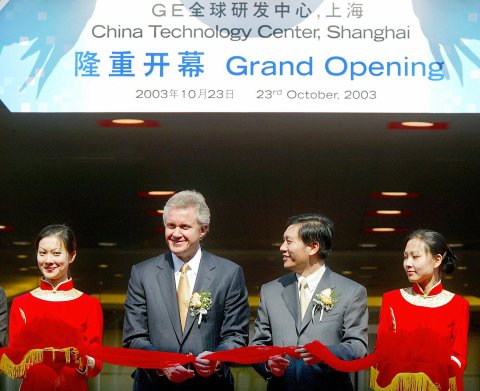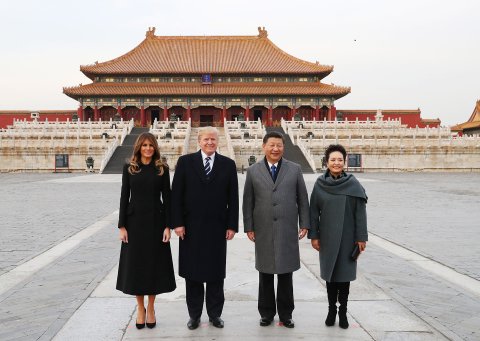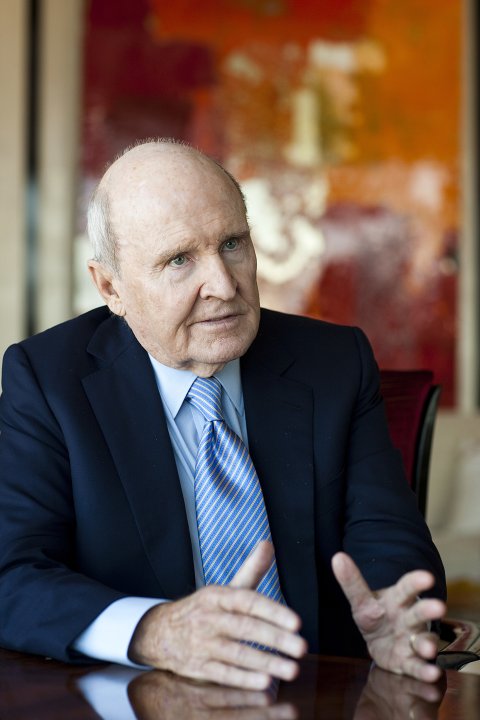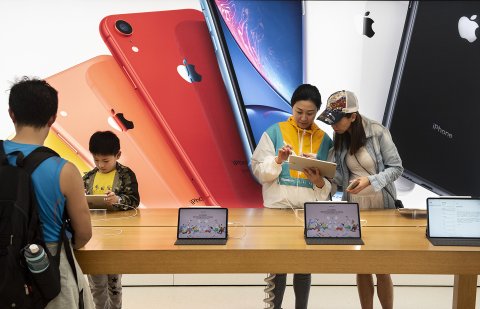How the Us Made China Great Again
In the summertime of 2010, Jeff Immelt, then the CEO of General Electric, sat on one of the private planes at his disposal, headed to a conference of Italian business executives in Rome. He had just come from meetings in Shanghai and Beijing, and was in a sour mood. GE had spent years—and invested millions - in China, assertive, similar and so many other Fortune 500 companies did, that it was the futurity: the largest and thus nearly important market in the world. The year before GE'south sales there had been $v.three billion.
At present Immelt was losing organized religion. Growth in the company's key businesses, including ability and medical imaging, had begun to slow from the levels GE expected. Government regulators, meanwhile, seemed increasingly hostile, holding up permits and increasing inspections of company facilities for what seemed like no reason. In Rome, Immelt let his boyfriend CEOS know what he was thinking. "I really worry almost Cathay," he told the group, according to several executives present. "I am not certain that in the end they desire any of us [strange companies] to win, or any of us to be successful."

In the years to follow, similar grousing would become commonplace among senior Fortune 500 executives. Life wasn't getting any easier in China, it was getting tougher. But few companies—GE included—were willing to practise much virtually it, past bringing their complaints to the U.South. regime and petitioning for a formal trade complaint. The risk of angering their hosts in Beijing was too great. Indeed, when news of Immelt's remarks in Rome later fabricated headlines in the financial press, GE beat a hasty retreat, issuing a statement saying that the CEO'southward words had been "taken out of context."
About 10 years later, the U.S. Communist china relationship—for decades routinely called the most of import bilateral relationship on the planet—has all but collapsed. When this magazine went to press, Presidents Donald Trump and Xi Jinping were scheduled to meet on the sidelines of the G20 meeting in Osaka, in the midst of a deepening trade conflict between the world'south two largest economies. The deteriorating economic human relationship is but i aspect of what has devolved into Cold War two.0, as the two countries now openly vie for influence in East asia and beyond.

In the U.S., in the customs of China watchers and policy makers, the stunning plough in relations with Beijing has triggered an increasingly acrimonious debate about a basic question, 1 with deep historical resonance: Who lost Mainland china?
The part of big business in the electric current dismal situation can't be ignored.
For more a decade, I watched it unfold from a front row seat, as China bureau chief for Fortune Magazine and then for Newsweek. As the earth's most populous nation, China has e'er been a dream market place for foreign businessmen. Shirtmakers in England at the turn of the century dreamed of selling "two billion sleeves" in Prc. Today, Mark Zuckerberg takes Mandarin lessons in the promise that one day he tin can lure 1.3 billion Chinese to Facebook.
China Has E'er Been Irresistible.
When, under Deng Xiaoping, the architect of Beijing'south rise to economic power, China began opening itself to foreign investment, the coin flowed in: beginning in search of inexpensive labor in depression tech industries similar footwear and textiles, then in pursuit of those 1.three billion customers, as China got steadily richer as economic reforms took hold.
For American CEOS, the potential Chinese bonanza meant that U.South. policy toward Beijing had to revolve around nurturing—and expanding—the economic human relationship. Then strong was the vision of Communist china transforming itself from an insular, hostile and dirt poor nation into the country of "one billion customers," as James McGregor, former head of the American Bedchamber of Commerce in Beijing put it, that even the shock off the 1989 massacre in Tiananmen Square—the thirtieth anniversary of which only passed—faded in relatively short order. Just 2 years after Tiananmen, American direct investment in Mainland china shot upward from simply $217 one thousand thousand in 1991 to almost $2 billion the next year.
For U.S. policymakers and businessmen alike, information technology was hard to enlarge how promising the world looked back so. The Soviet Union had fallen and Deng was bringing China into the world. Immelt's predecessor, sometime GE CEO Jack Welch, told me on a visit to Shanghai a few years ago that in those days "we all had our fingers crossed that the heaven would be the limit [for Red china economically]. And we basically turned out to be right."

The big business concern community made it clear—showtime to the Clinton administration and then to his successor, George W. Bush—that merchandise with China was its highest priority. Washington readily agreed. "The Fortune 500 and the U.S. Sleeping accommodation of Commerce didn't but influence policy," says Alan Tonelson, a veteran trade analyst in Washington, "they made policy."
The first goal for corporate America was to get merchandise relations normalized "permanently" (known as PNTR, for "permanently normalized merchandise relations"). Prior to 2000, because of the postal service Tiananmen hangover, Washington every twelvemonth would have to decide whether to grant Prc the same admission to the U.Southward. market place that it did other trading partners. With the U.S. Chamber of Commerce and the U.S. China Business Quango every bit point men in Washington, corporate America lobbied difficult for the move. More than 600 companies pushed for China's PNTR status. They got what they wanted. Subsequently a contentious debate with human rights advocates, the U.S. canonical PNTR in 2000.
Unacknowledged at the time by its corporate advocates was the huge impact on corporate supply chains that the seemingly obscure legislative change would eventually crusade. As the economists Justin Pierce and Peter Schott argued in an influential 2016 study entitled "The People's republic of china Daze"—which looked at how swiftly U.Due south. manufacturing employment declined as Mainland china'southward rise accelerated—"without PNTR there was ever a danger that Communist china's favorable admission to the U.S. marketplace would exist revoked, which in turn deterred U.Southward. firms from increasing their reliance on Prc based suppliers. With PNTR in hand, the floodgates of investment were opened, and U.S. multinationals worked manus in glove with Beijing to create new, China-centric supply bondage."
The Fortune 500 oversupply was simply getting started.
China's adjacent goal was to bring together the Earth Merchandise Organization, the international torso that sets the rules of global trade and is supposed to enforce them. WTO accretion would be China'southward economic coming out party—the ultimate signal that Beijing had transformed itself into a global trading ability. The U.Due south. business concern community was all for it, arguing that it meant "at long terminal that Prc agrees to play by the rules of the road," while ensuring that U.S. exporters "would benefit from a broad reduction in Chinese tariffs on imports," as a paper from the U.S.-China Business organization Council argued at the time.
In December of 2001, they got their wish. China officially acceded to the WTO. And the U.S. Chamber of Commerce practically turned handstands, issuing a statement saying that it was "unquestionably a win for U.Due south. exporters and U.S. consumers."
WTO accession served as rocket fuel to U.Due south. corporate investment in China. Information technology skyrocketed in the first decade of the new century (see chart ) In 2012 I met James Vance, the American CEO of a supplier to Nashville's Hospital Corp. of America, a guy whose company made walking boots, air-casts, slings and other depression cease medical equipment. He said not long after China joined WTO his firm moved production more often than not from the southeastern role of the U.S. to the province of Guangdong in southeastern China. The reason: "We could make the stuff and so much cheaper and export it to the world than we could in the U.S. Information technology was that uncomplicated." And considering it was that simple, near anybody got into the act. By 2015, the share of China'south exports to the U.Southward. that came from foreign-owned companies was no less than 60 percent.
A neighbor of mine in Beijing in the early 2000s headed Ford Motor Corp.'s massive new institute in the city of Chongqing, 900 miles to the southwest. (He would go out during the calendar week and return to his family unit on weekends.) In an era when it was politically wrong for an American corporate executive to say and so, he told me i evening he thought eventually Ford would move more production to China, not just for the domestic market (which is now, by the number of vehicles sold, the largest car market in the globe) but to send away besides. "This identify volition get just similar Japan, an export powerhouse," he said. (Ironically, the fear of exactly that happening in such a loftier contour, politically sensitive manufacture, especially in the developed globe, has really slowed Mainland china's emergence as an auto exporter.)
Over the final xxx years, prominent American companies have become part of the cloth of Chinese life. Starbucks is every bit ubiquitous in Beijing or Shanghai equally information technology is in New York. General Motors sells more cars in China than anywhere else in the world. KFC and Papa John'south are in all major cities. And Apple tree has opened 42 of its iconic retail stores.

But the visitor'southward reach in China goes far beyond that. An entire network of companies, led by Taiwan'southward Foxconn, assembles or supplies Apple products in Red china. Today, virtually five million Chinese are employed by companies in that network.
The decision to set up such People's republic of china-centric supply bondage would become the stuff of the "Cathay Shock"—the outsourcing of manufacturing jobs that would, to the dismay of most of the U.S. corporate establishment, play a significant role in the election of Donald J. Trump more than a decade and a one-half later.
The belief among executives back in the early 2000s was that China's economical reform would continue indefinitely, in office because Beijing had been embraced by the outside world. People's republic of china would eventually become the earth's largest economy, but that was OK, considering it would be a "normal'' state, playing past the rules as laid downwardly in the post World War II U.Southward. dominated gild. As former Deputy Secretary of State Robert Zoellick famously wrote, the goal of western policy toward Beijing was to encourage information technology to go "a responsible stakeholder" in that established world order. All along, until Donald Trump came to function, the underlying assumption was that Beijing was willing to allow the United States define what being a "responsible stakeholder" meant. That was a fault.
Trouble in Paradise
For most of the commencement decade of this century, reform did continue. Simply the Fortune 500'due south honey thing with the nation came back to seize with teeth them. Increasingly, China began to generate its ain competitors to the strange firms that had set up shop there. Land owned companies in large industries ( oil and gas, pharmaceuticals, finance and telecommunications among them) pushed their government to favor domestic players, and make life harder for foreigners. When Hu Jintao became President in 2003, he was receptive to that kind of force per unit area. Economical reform slowed.
Then something else happened: the 2008 global financial crunch, which tanked the U.S. and the rest of the adult globe, but not Communist china. The political leadership in Beijing looked around and said, in effect, "expect a minute: nosotros were supposed to play by these guys' rules and look what happened to them." In the future, economically speaking, China would increasingly play by its own rules.
That has particularly been the case under 11 Jinping, who succeeded Hu in 2012. Eleven is a nationalist who believes sooner or subsequently People's republic of china will exist number i, and the sooner the better as far as he'southward concerned. The American business community began to empathise that the ground in People's republic of china was shifting under their feet before long subsequently Eleven took ability. XI's government fabricated information technology plain, in its and then called Made In Red china 2025 plan, that information technology sought to dominate key growth industries in the earth. And though that meant for now Beijing would still buy loftier technology components from the U.S., it would do so merely in the service of developing Chinese competitors, who, the government hopes, will eventually supplant American, Japanese and European firms in every key industry. Then much for the 1.ii billion consumers.
James McGregor, the former head of AmCham in Beijing and now the China CEO for APCO Worldwide, the consulting firm, says he's been shocked at how slow on the uptake many U.S. companies accept been most what the trajectory in China is, and has been. He notes, "In manufacture after industry there is a smaller and smaller piece of the pie available to a lot of foreign firms. That's just a fact."
The reason they were tiresome to adapt to that is, well, things had been going and so well. "A lot of them had convinced themselves that [Beijing] would ride the reform bicycle forever and the economy would grow and grow and everything would be fine." The fact that that wasn't happening put at risk all the difficult work and investment needed to establish a beachhead in Cathay.
Well before Donald Trump was elected, the carping about Beijing's policies from the Fortune 500 crowd intensified. In the almanac reports issued past the American Chambers in both Beijing and Shanghai, the number of respondents who felt the regulatory environment in Mainland china was worsening steadily increased. A senior executive at Honeywell in 2015 told me flatly that his company was fed up with Beijing'southward demands for engineering transfer. Friends at CISCO and Microsoft said the same. Privately, the complaints about companies like Huawei stealing intellectual property also ratcheted up.
Moaning and groaning was one thing. Actually doing something virtually it, from a corporate or governmental policy perspective, was another. It rarely happened. And for that, big business is partly to blame. Michael Froman, who was the United states of america Trade Representative under Barack Obama, acknowledges that businesses'due south unwillingness to put its name publicly on trade complaints—in bringing a high profile case to the WTO, for example—"was a definitely a existent problem. Non many of these companies," he says, "wanted to stick their heads above the parapet for fear of taking incoming burn." In eight years of the Obama administration, xvi cases against Communist china were brought to the WTO.
That number could well accept been higher, merchandise hawks like Alan Tonelson believe, were information technology not for corporate America'due south relative passivity in the face of the economic challenges Beijing posed. The regime had been persuaded that, as in the 1950s in America (when the first "Who Lost China" debate raged) what was proficient for General Motors was good for the country.
Then came the election of Donald Trump, who came to office threatening holy hell if Beijing didn't reduce its merchandise surplus with the U.Due south., stop its intellectual property theft and forced engineering transfer. Worn downward by Beijing and shocked by Trump's ballot, some members of the Fortune 500 snapped out of their shock. The status quo when it came to dealing with Beijing wasn't going to cut it.
In December of 2016, during the transition, a minor group of senior executives from the U.S. semiconductor industry made the pilgrimage to Trump Tower to see with incoming administration officials, including the man who would be the new U.S. Trade Representative, Robert Lighthizer.
The delegation, two sources nowadays say, included a representative from Intel, who acknowledged his company was across fed up with IP theft, amid other concerns. In an interview, Lighthizer is circumspect when asked if U.S. companies waited also long in allowing the government to get tougher with China. "That may be true of some, simply non for others," he says, noting that in his years as a trade lawyer at Skadden Arps he brought several cases against China equally an chaser for U.S. steel companies. But, he allows, "yeah, I'd hold it was past fourth dimension for a more than robust response [to Beijing.]''
The problem now is that Trump's response has been to use the battering ram of tariffs, which some in the administration hope volition strength U.S. multinationals to rip upwardly their China-axial supply lines. Anecdotally there are reports that some companies have begun to do that, simply corporate resistance to it is, not surprisingly, intense. "Having spent so much time and money building out their supply chains, there aren't too many CEOS who want to spend more time and money rebuilding them somewhere else," says sometime Trade Representative Froman, now a senior executive at Mastercard. And with a Presidential election now less than eighteen months abroad, the possibility that a Trump successor may not be a "tariff man" (or adult female) besides means companies are unlikely to tear up their supply lines, at least for now.
Beyond that, there is little consensus as to what U.South. policy should be toward Prc, whoever is inaugurated in 2021. "These guys just long for the practiced old days," says trade annotator Tonelson. And he may exist right. The U.S. Chamber of Commerce, which insists today it did the right thing in helping lead the charge for China gaining permanent merchandise condition and joining the WTO, is a staunch opponent of Trump'south tariffs. And a recent survey of American companies by AmCham Beijing showed that more than than forty per centum of respondents said they just wanted a return to the "pre tariff status quo."
That fact, make no mistake, will put smiles on the faces of 11 Jinping's trade negotiators whenever they next run into their American counterparts. Communist china knows that the contempo history has been that the U.Southward. government will dance to U.S. business's tune. Trump and his squad of advisers may non be inclined to practice that. Merely their problem is, at that place are no like shooting fish in a barrel solutions to resolving the trade issues that beset U.South.-Red china relations. Lighthizer has been telling Trump to hang tough and, if necessary, increase the tariffs on Beijing, arguing that that volition force China to a deal sooner or later.
But corporate America hates that idea, and, problematically for Trump and his re-election prospects, so does the U.S. stock market. Increasing costs to U.S. businesses and consumers from goods made in China isn't a winning formula on Wall Street, nor in 2020.
The truth now dawning on both the U.S. People's republic of china policy crowd and the Fortune 500, is that there may not be any respond for the dilemmas Beijing now presents to the U.South. No less than Henry Kissinger, the man who, under Richard Nixon, secretly paved the way for the U.Southward. and Mainland china to re-institute relations, recently said he thought designing a "grand strategy" to deal with Cathay today is "besides hard."
If that turns out to be true—and information technology may—American big business will accept to stand up upwards and partly take the arraign.
spaldingcabol1944.blogspot.com
Source: https://www.newsweek.com/how-americas-biggest-companies-made-china-great-again-1445325
0 Response to "How the Us Made China Great Again"
Post a Comment